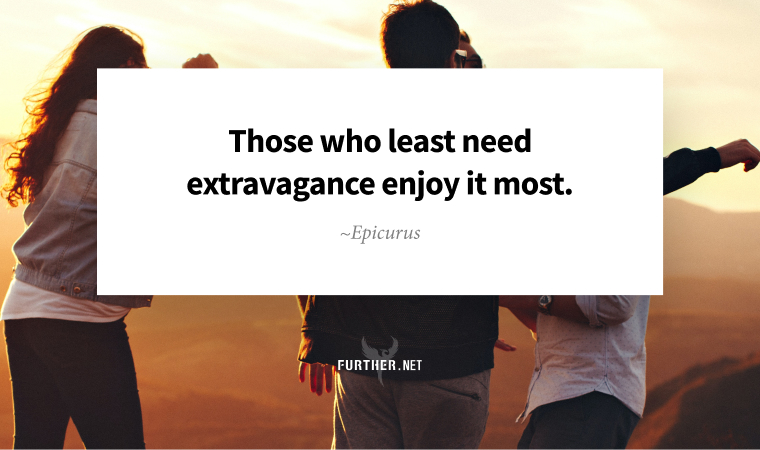
What comes to mind when you think of Epicureanism, the school of thought founded by Greek philosopher Epicurus and the primary counterpoint to Stoicism?
If you’re like most people, at best it’s cooking and at worst gluttonous hedonism. After all, Epicurus maintained that pleasure is the source of all happiness and the only truly good thing.
But Epicurus wasn’t a hedonist and certainly didn’t advocate it. He meant “pleasure” in the form of the Greek word ataraxia, or a state of tranquility in which we are free from anxiety.
That sounds pretty tame compared to the stereotypical wanton wine, women, and song. But when you think of our general state of modern life where even missing out sparks fear, being free from anxiety sounds pretty pleasurable to me. Way too many people today are instead miserable, lonely, and afraid.
Ironically, pursuing hedonistic extravagance in all things leaves you wracked with anxiety. A constant demand for the finest foods, first class experiences, and perfect sexual partners will always leave you wanting more and perpetually unsatisfied.
This is what Epicurus meant when he said, “Those who least need extravagance enjoy it most.” In her book Living for Pleasure: An Epicurean Guide to Life, author Emily Austin puts it this way:
When we intensely desire something we aren’t sure we can get — anxiety. When we get it and worry we can’t keep it — anxiety. When we compete for what we want or want what others have — anxiety, envy, and resentment.
Epicurus maintains that we are always psychologically motivated by the achievement of tranquility. And the wise Epicurean realizes that the pursuit of direct and constant hedonism is no way to get there. For Epicurus, hedonistic prudence is the crowning art of living well.
Austin explains this idea in her book:
Epicurus thinks we go wrong because we set out to get what we want in life — happiness — without art or strategy, often imprudently choosing whatever pleasure is closest and easiest. We fall into the easy habit of unreflective “direct hedonism,” rather than playing the long game of “indirect hedonism,” which requires deliberation and some measure of inconvenience.
Unlike the Stoics who want you to find joy in duty, Epicurus says we engage in duty to earn our joy and avoid anxiety. Or as the more contemporary philosophical troupe Loverboy put it, everybody’s working for the weekend.
There are many of us who have tried to find happiness in hedonism (raises hand), but living in a virtuous state of self-denial isn’t all that much fun either. If you’ve dove into the recent popularity of Stoicism and emerged dissatisfied, give Austin’s book a read to see why their biggest philosophical rival offers a model for living that may be a better fit.
Further reading:
Living for Pleasure: An Epicurean Guide to Life (Amazon)
Keep going-
P.S. New to Further? Join us here.
Straight Up Strength
Sitting at a desk all day is no good for your fitness, and it’s also terrible for your posture. But in the time it takes to make a cup of tea, you can build your core muscles, increase hip flexibility, and correct the case of “nerd neck” you may be sporting.
The Five-Minute Fix: How to Improve Your Fitness, Strength and Posture (The Guardian)
50+ (100)
Harvard Genetics Professor David Sinclair and team have made a monumental breakthrough in anti-aging science that we’ll be talking about more soon. This interview will give you the flavor of what’s happened and what it means.
Has the First Person to Live to be 150 Been Born? (Harvard Gazette)
Returning the Favor
Our parents took care of us, and now many of us will do the same for them. Just like raising children requires patience and financial planning, so does providing for your aging parents.
Caring for Aging Parents Takes Planning Ahead and Patience (Kiplinger)
Stupid Is as Stupid Does
People who are less than bright can be wildly entertaining to the rest of us. Stupidity, though, has its dark side. For theologian and philosopher Dietrich Bonhoeffer, the stupid person is often more dangerous than the evil one.
We Have More to Fear from Stupid People than Evil Ones (Big Think)
The Ancient Secret to Relaxed Productivity

By Trudi Roth
Have you noticed lately there’s a curious alignment between productivity and distraction? Of course, the two are theoretically enemies of each other. But nowadays, both are equally demonized, which makes you wonder why they’re not canceling each other out.
On the one hand, there’s a plea to ban toxic productivity. On the other, we’re constantly being told how we’re so distracted by technology that we can’t focus anymore.
So, which one is it? Are we working too hard or hardly working?
The answer is both. Luckily, this isn’t a new quandary — the ancients developed philosophies and practices to crack the code for balanced productivity that are just as effective today as they were ages ago.
The History of Distraction
The rise of smartphones — those tiny handheld forces of dopamine-driving distraction — started about 20 years ago. But the complaints about new technology destroying focus go back 2,000 years when Rome’s Seneca the Younger complained that the proliferation of books was a distraction.
From then on, as print technology evolved, well-known thinkers from Chinese philosopher Zhu Xi to Italian poet Petrarch and French theologian Jean Calvin blamed the glut of books for the degradation of attention and memory.
Apparently, the modern mind — whether metaphorically undernourished, harassed, or disoriented — has been in no position to do any serious thinking for a long time.
Nowadays, we romanticize reading books as a sign of greater focus and a “normal brain.” Rather than praise or blame the medium, maybe it’s time to target the real culprit: how we respond to external stimuli. For less distraction and greater productivity, you can take your cues from the Middle Ages.
Make Like a Monk
A few hundred years after Seneca griped about books, Abba Poemen, the leader of the monastic community of Scetis, called out what he saw as the main cause of his monks’ lack of productivity:
The chief of all wickednesses is the wandering of the thoughts.
A little harsh, but the sentiment holds up. What the monks learned to do to stay present and productive then is as effective in our modern times:
- Identify the purpose of your work and who it benefits. Research shows that understanding who you’re helping boosts motivation.
- Make space to do your work. You don’t have to be a full-on hermit to benefit from prioritizing solitude and steering clear of other people’s drama.
- Create a routine that supports your optimal working style.
- Move — a little exercise can calm your mind.
- Customize how you consume your info (format, medium) and build habits with your tech usage that support your desired results.
Distraction is nothing new, nor is the quest for focus. Just make a conscious effort to quiet your mind, and productivity will follow.
We’ve Always Been Distracted (Aeon)
further: flashback

Journey – Separate Ways (Worlds Apart)
Frontiers, 1983
Sure, it would be easy to pull a winning track from Journey’s 1981 album Escape. It takes courage, though, to select the cringe-inducing video for Separate Ways (Worlds Apart) from follow-up Frontiers. It’s an amazing song, but in 1999 MTV chose it as 13th on its list of the 25 Worst Videos of All Time — enjoy! (YouTube)
further: sharing

Further subscribers who share the newsletter with friends can gain three months of access to our exclusive membership community Well + Wealthy with only five referrals. Get your own free weekly dose of health, wealth, travel, and happiness advice here, and find out all the details on our referral program.
Thank you for sharing Further!
